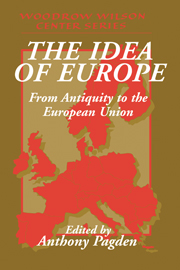Book contents
- Frontmatter
- Contents
- Acknowledgments
- Introduction
- 1 Europe: Conceptualizing a Continent
- 2 Some Europes in Their History
- 3 “Europe” in the Middle Ages
- 4 The Republican Mirror: The Dutch Idea of Europe
- 5 The Napoleonic Empire and the Europe of Nations
- 6 Homo Politicus and Homo Oeconomicus: The European Citizen According to Max Weber
- 7 The European Self: Rethinking an Attitude
- 8 European Nationalism and European Union
- 9 From the Ironies of Identity to the Identities of Irony
- 10 Muslims and European Identity: Can Europe Represent Islam?
- 11 The Long Road to Unity: The Contribution of Law to the Process of European Integration since 1945
- 12 The Euro, Economic Federalism, and the Question of National Sovereignty
- 13 Identity Politics and European Integration: The Case of Germany
- 14 Nationalisms in Spain: The Organization of Convivencia
- 15 The Kantian Idea of Europe: Critical and Cosmopolitan Perspectives
- Contributors
- Index
- Cambridge Cultural Social Studies
Introduction
Published online by Cambridge University Press: 14 July 2009
- Frontmatter
- Contents
- Acknowledgments
- Introduction
- 1 Europe: Conceptualizing a Continent
- 2 Some Europes in Their History
- 3 “Europe” in the Middle Ages
- 4 The Republican Mirror: The Dutch Idea of Europe
- 5 The Napoleonic Empire and the Europe of Nations
- 6 Homo Politicus and Homo Oeconomicus: The European Citizen According to Max Weber
- 7 The European Self: Rethinking an Attitude
- 8 European Nationalism and European Union
- 9 From the Ironies of Identity to the Identities of Irony
- 10 Muslims and European Identity: Can Europe Represent Islam?
- 11 The Long Road to Unity: The Contribution of Law to the Process of European Integration since 1945
- 12 The Euro, Economic Federalism, and the Question of National Sovereignty
- 13 Identity Politics and European Integration: The Case of Germany
- 14 Nationalisms in Spain: The Organization of Convivencia
- 15 The Kantian Idea of Europe: Critical and Cosmopolitan Perspectives
- Contributors
- Index
- Cambridge Cultural Social Studies
Summary
Today, as the older territorial and national boundaries of the world become increasingly uncertain, the quest for national and transnational identity has intensified. This, as Talal Asad observes in chapter 10, is a fairly recent phenomenon, the product of “the individual's social locations and psychological crises in an increasingly uncertain world.” Previously, anxieties about identity tended to afflict only states of relatively recent creation—the so-called “new states” in Africa and Asia in particular—and areas of massive and diverse emigration such as the United States. The states that made up “Europe,” however, had supposedly been of such antiquity and undisputed cultural homogeneity that their members rarely troubled to ask themselves who they were. But the experience of two world wars, combined with ever-increasing migration for political, economic, or broadly cultural motives across the rapidly dissolving frontiers of Europe, have forced upon Europeans the uneasy sense that their self-confidence in knowing just who they are is almost certainly unfounded.
This volume traces from the ancient world to the present the determining features of what might count as a collective “idea” of Europe as a political and cultural domain. This is not, of course, a linear history. No such history could be written. Our objective is rather to identify the concerns and convictions, the shifting discursive practices and the different languages, political, cultural, and economic, of which all identities are constituted. The contributors represent different disciplines—history, anthropology, political science, the law—as they do different intellectual styles.
- Type
- Chapter
- Information
- The Idea of EuropeFrom Antiquity to the European Union, pp. 1 - 32Publisher: Cambridge University PressPrint publication year: 2002
- 6
- Cited by

